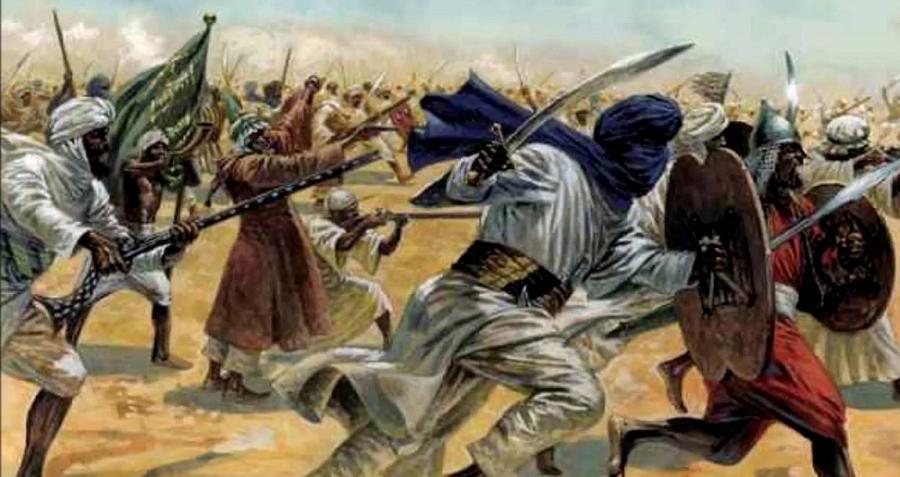Jihad Also Means Killing And Dying

YouTube/Güzel Bir Neşid
While virtually any Muslim would be comfortable with “jihad” being applied to the above actions, the meaning of jihad that really grabs headlines in the West is jihad bis saif, or “jihad by sword.”
While many Europeans and Americans think they have a handle on what this looks like, and many are frankly tired of being told that terrorism has nothing to do with Islam, a look into the historical context of jihad bis saif really does support the narrative that terrorists are perversely twisting jihad in a way that no honest Muslim theologian would condone.
In Orthodox tradition, a Muslim may wage this jihad for two reasons: to resist invasion and to liberate other Muslims. In the early days of Islam, long before the invention of airplanes or television sets, invasions and liberations were clear, easy concepts to define.
Modern radicals argue that infidel countries, by existing at all, are continuously oppressing Muslims and are “invading” Muslim societies with anti-Islamic propaganda. This, in their view, fully justifies any act of war.
Even with this charitable reading of jihad, terrorists are still pretty far off the reservation by mainstream Islam’s standards. Whatever the reason for fighting, jihad bis saif has very strict rules combatants must follow.
Most of the rules for fighters seem to anticipate some of the Geneva Convention: Only combat against enemy soldiers (defined as adult men who have taken up arms). Women, children, those too old to fight, and the disabled are to be spared.
Prisoners must be allowed to surrender, and on surrendering they must be led to a safe location away from the fighting and treated well. POWs must be fed and housed as well as their guards, and in the event of food shortages, they get fed first. Captured Hindus and other polytheists may be proselytized with the aim of winning them to Islam.*
Property is not to be gratuitously damaged – by cutting down trees, for example, or by knocking down houses. Enemies who offer an honorable peace should be negotiated with, rather than destroyed. It’s worth noting that these rules were in place 1,100 years before European powers ratified an almost identical set of rules in the 1850s.
*Quran, Surah 9: At-Taubah, Verse 6:
And if anyone of the [unbelievers] seeks your protection then grant him protection, so that he may hear the Word of Allah, and then escort him to where he can be secure, that is because they are men who know not.
Bad Jihad

YouTube/ODN
Unfortunately, the West isn’t up against any historical meaning of jihad now. Muslim armies who tried to apply Mohammed’s rules for mujahid spent the Victorian Age getting blasted by European cannon, and so the more excitable elements of the Muslim world have rationalized their way into a very un-Quranic meaning of jihad.
The 9/11 attacks, for example, violated Quranic law in dozens of ways, notably in that they gratuitously damaged buildings, killed noncombatants, gave no opportunity for surrender, and could only very tenuously be said to have been in response to an invasion or oppression.
Another provision that the likes of al-Qaeda tend to skirt is that the concept of jihad bis saif came into being at a time when Islam had one unified chain of command, and so the Quran insists that it can only properly be a holy war if the Prophet (or Caliph) declares it to be so. In later years, with the split between factions and development of more local control systems, “leader” came to mean lower-ranking worthies, but jihad could still only be declared by somebody in authority.
This injunction is still taken seriously enough that when Saddam Hussein tried to declare jihad against the United States in 1991, most of the Islamic world laughed at him. Even Osama bin Laden took the precaution of having himself named an emir before starting his jihad in the 1990s.
Whatever the history of jihad — and it is quite a concept for over a billion people to believe in — its present is what it is. Fighting back the jihad of the truck bomb isn’t going to be easy, not least because there no longer seems to be any kind of centralized authority who can tell the mujahid when enough is enough.
In a sublime twist of irony, it may actually be a better understanding of jihad’s past that will help the most with the future struggle. When responsible adults can reassert control over the frontline hotheads who volunteer to be suicide bombers, a brief reading of the Quran itself may be enough to turn a few of them away from the seconds of glory a martyr’s death earns and toward the decades of work required of a proper jihad.
Intrigued by this look at the meaning of jihad? Next, brush up on your knowledge of the treatment and role of women in Islam. Then, have a look at harrowing photos from the war against ISIS.





